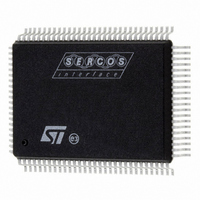ST92F150JDV1QC STMicroelectronics, ST92F150JDV1QC Datasheet - Page 199

ST92F150JDV1QC
Manufacturer Part Number
ST92F150JDV1QC
Description
IC MCU 128K FLASH 100-PQFP
Manufacturer
STMicroelectronics
Series
ST9r
Datasheet
1.ST92F150CV1TB.pdf
(429 pages)
Specifications of ST92F150JDV1QC
Core Processor
ST9
Core Size
8/16-Bit
Speed
24MHz
Connectivity
CAN, I²C, LIN, SCI, SPI
Peripherals
DMA, LVD, POR, PWM, WDT
Number Of I /o
77
Program Memory Size
128KB (128K x 8)
Program Memory Type
FLASH
Eeprom Size
1K x 8
Ram Size
6K x 8
Voltage - Supply (vcc/vdd)
4.5 V ~ 5.5 V
Data Converters
A/D 16x10b
Oscillator Type
Internal
Operating Temperature
-40°C ~ 125°C
Package / Case
100-QFP
Processor Series
ST92F15x
Core
ST9
Data Bus Width
8 bit, 16 bit
Data Ram Size
6 KB
Interface Type
CAN, I2C, SCI, SPI
Maximum Clock Frequency
24 MHz
Number Of Programmable I/os
80
Number Of Timers
5 x 16 bit
Operating Supply Voltage
4.5 V to 5.5 V
Maximum Operating Temperature
+ 105 C
Mounting Style
SMD/SMT
Development Tools By Supplier
ST92F150-EPB
Minimum Operating Temperature
- 40 C
On-chip Adc
16 bit x 10 bit
Case
QFP
Lead Free Status / RoHS Status
Lead free / RoHS Compliant
Other names
497-2137
Available stocks
Company
Part Number
Manufacturer
Quantity
Price
- Current page: 199 of 429
- Download datasheet (8Mb)
MULTIFUNCTION TIMER (Cont’d)
10.4.5 Interrupt and DMA
10.4.5.1 Timer Interrupt
The timer has 5 different Interrupt sources, be-
longing to 3 independent groups, which are as-
signed to the following Interrupt vectors:
Table 40. Timer Interrupt Structure
The three least significant bits of the vector pointer
address represent the relative priority assigned to
each group, where 000 represents the highest pri-
ority level. These relative priorities are fixed by
hardware, according to the source which gener-
ates the interrupt request. The 5 most significant
bits represent the general priority and are pro-
grammed by the user in the Interrupt Vector Reg-
ister (T_IVR).
Each source can be masked by a dedicated bit in
the Interrupt/DMA Mask Register (IDMR) of each
timer, as well as by a global mask enable bit (ID-
MR.7) which masks all interrupts.
If an interrupt request (CM0 or CP0) is present be-
fore the corresponding pending bit is reset, an
overrun condition occurs. This condition is flagged
in two dedicated overrun bits, relating to the
Comp0 and Capt0 sources, in the Timer Flag Reg-
ister (T_FLAGR).
10.4.5.2 Timer DMA
Two Independent DMA channels, associated with
Comp0 and Capt0 respectively, allow DMA trans-
fers from Register File or Memory to the Comp0
Register, and from the Capt0 Register to Register
File or Memory). If DMA is enabled, the Capt0 and
Comp0 interrupts are generated by the corre-
sponding DMA End of Block event. Their priority is
set by hardware as follows:
– Compare 0 Destination — Lower Priority
– Capture 0 Source — Higher Priority
The two DMA request sources are independently
maskable by the CP0D and CM0D DMA Mask bits
in the IDMR register.
Overflow/Underflow
Interrupt Source
COMP 0
COMP 1
CAPT 0
CAPT 1
Vector Address
xxxx x110
xxxx x100
xxxx x000
The two DMA End of Block interrupts are inde-
pendently enabled by the CP0I and CM0I Interrupt
mask bits in the IDMR register.
10.4.5.3 DMA Pointers
The 6 programmable most significant bits of the
DMA Counter Pointer Register (DCPR) and of the
DMA Address Pointer Register (DAPR) are com-
mon to both channels (Comp0 and Capt0). The
Comp0 and Capt0 Address Pointers are mapped
as a pair in the Register File, as are the Comp0
and Capt0 DMA Counter pair.
In order to specify either the Capt0 or the Comp0
pointers, according to the channel being serviced,
the Timer resets address bit 1 for CAPT0 and sets
it for COMP0, when the D0 bit in the DCPR regis-
ter is equal to zero (Word address in Register
File). In this case (transfers between peripheral
registers and memory), the pointers are split into
two groups of adjacent Address and Counter pairs
respectively.
For peripheral register to register transfers (select-
ed by programming “1” into bit 0 of the DCPR reg-
ister), only one pair of pointers is required, and the
pointers are mapped into one group of adjacent
positions.
The DMA Address Pointer Register (DAPR) is not
used in this case, but must be considered re-
served.
Figure 104. Pointer Mapping for Transfers
between Registers and Memory
Counters
Address
Pointers
DMA
MULTIFUNCTION TIMER (MFT)
16 bit Counter
16 bit Counter
Comp0 16 bit
Comp0 DMA
Register File
Addr Pointer
Addr Pointer
Capt0 16 bit
Capt0 DMA
YYYYYY11(l)
YYYYYY10(h)
YYYYYY01(l)
YYYYYY00(h)
XXXXXX11(l)
XXXXXX10(h)
XXXXXX01(l)
XXXXXX00(h)
199/429
9
Related parts for ST92F150JDV1QC
Image
Part Number
Description
Manufacturer
Datasheet
Request
R

Part Number:
Description:
BOARD PROGRAM FOR ST92F150 MCU
Manufacturer:
STMicroelectronics
Datasheet:

Part Number:
Description:
BOARD EVALUATION FOR ST9 SERIES
Manufacturer:
STMicroelectronics
Datasheet:

Part Number:
Description:
BOARD EMULATOR FOR ST9 SERIES
Manufacturer:
STMicroelectronics
Datasheet:

Part Number:
Description:
MCU, MPU & DSP Development Tools ST9 Dedication Board
Manufacturer:
STMicroelectronics
Datasheet:

Part Number:
Description:
STMicroelectronics [RIPPLE-CARRY BINARY COUNTER/DIVIDERS]
Manufacturer:
STMicroelectronics
Datasheet:

Part Number:
Description:
STMicroelectronics [LIQUID-CRYSTAL DISPLAY DRIVERS]
Manufacturer:
STMicroelectronics
Datasheet:

Part Number:
Description:
BOARD EVAL FOR MEMS SENSORS
Manufacturer:
STMicroelectronics
Datasheet:

Part Number:
Description:
NPN TRANSISTOR POWER MODULE
Manufacturer:
STMicroelectronics
Datasheet:

Part Number:
Description:
TURBOSWITCH ULTRA-FAST HIGH VOLTAGE DIODE
Manufacturer:
STMicroelectronics
Datasheet:

Part Number:
Description:
Manufacturer:
STMicroelectronics
Datasheet:

Part Number:
Description:
DIODE / SCR MODULE
Manufacturer:
STMicroelectronics
Datasheet:

Part Number:
Description:
DIODE / SCR MODULE
Manufacturer:
STMicroelectronics
Datasheet:











